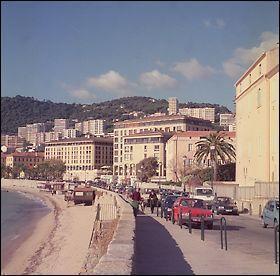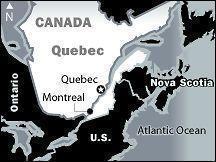 |
 |
|
|||||||
Sneaking In
Details Ahmed Ressam had committed to memory. Details he undoubtedly reviewed as he waited nervously in line, counterfeit passport in hand, at Charles de Gaulle Airport. That first month in Marseille, September 1992, had passed all too quickly. When his visa expired, his desire to stay in France did not. Ressam became an illegal immigrant.
Without proper papers, he drifted to Corsica, a French island that has long absorbed expatriate North Africans. There, Ressam found work picking grapes and painting houses — and found a thriving underground market in false documents.
On Nov. 8, 1993, he was arrested in Ajaccio, the Corsican capital, and charged with immigration violations. He faced deportation back to Algeria. The situation there was even worse than when he had left. Civil war was raging, and his friends faced being drafted by the army, coerced by the Islamic fundamentalists or killed by either side. His trial was scheduled for March 1994, and he was released to his own custody. Ressam didn't wait for a judge's decision on his fate. By Feb. 20, he was no longer Ahmed Ressam nor Nasser Ressam, but Tahar Medjadi. And he was on his way to the destination of his boyhood dreams as he boarded Air Canada Flight 871 to Montreal. When the plane touched down at Mirabel Airport, Ressam waited nervously to see if his doctored documentation would pass muster. His passport displayed his photo, carefully cut to size and pasted in place of that of the document's original owner. Would it fool Canadian officials? When he reached the front of the line, Ressam handed the passport to an immigration agent. The agent studied it for a moment, then pulled Ressam aside to meet with another official in a small room. In his 30 years on the job, inspector Real Genest had come face to face with hundreds of phony passports. He looked at this one under a microscope, then passed it under ultraviolet light, looking for differences in now glowing inks and glues. Is this a fake? he asked Ressam. Yes, the young man admitted, it is. Ressam was arrested and jailed. Deportation back to Algeria looked likely. But not under Canadian immigration policy, perhaps the most liberal in the world. Unlike France, Canadians saw immigrants — especially those who spoke English or French — not as a threat to their security or national identity, but as an economic asset. In its official policy, Canada called immigrants "a vital force in building and sustaining a stronger nation. Canada welcomes them." Even those in the country illegally were rarely deported. As the director of Canada's intelligence agency put it: "Once someone sets foot in Canada, then it is very hard and takes a very long time to get them out."
Ressam's fellow immigrants schooled him in the ways of their new host. It was easy to beat the system.
It was a wild tale. It worked, at least enough to put him into the Canadian court system. If he could convince an immigration magistrate of his story, he might be granted permanent-resident status. Ressam was released on bond and told to hire a lawyer for a March 28 hearing. But, meanwhile, how would he survive with no job and nowhere to live? He need only apply for welfare. Soon, he was receiving $550 a month from the Canadian government. What a great country! Such kindness would never have been possible in Algeria. Ressam found a room at a YMCA in Montreal and met a fellow Algerian who invited him to move into his apartment with other expatriates. He found an immigration lawyer named Denis Buron. Together, they prepared a case for political asylum. But when the court date arrived, Ressam never showed up. "Where the hell were you?" Buron asked over the phone. I forgot, Ressam told him. Predictably Ressam's application was rejected. He was arrested, fingerprinted, photographed.
And — what a great country! — he was given another court date and released into the streets of his new home.
|
|
|||||||||||||||||||||||||||||||||||||||||||||||||||||||||||||||||||||||||||||||||||||||||||||||
|
The Terrorist Within | Reprints seattletimes.com home |


